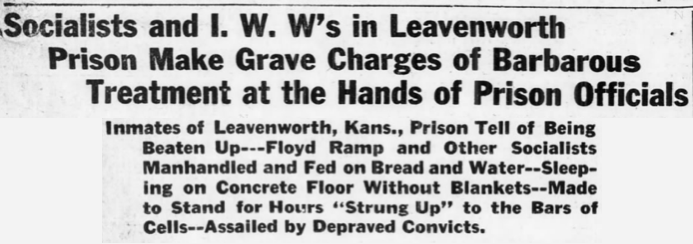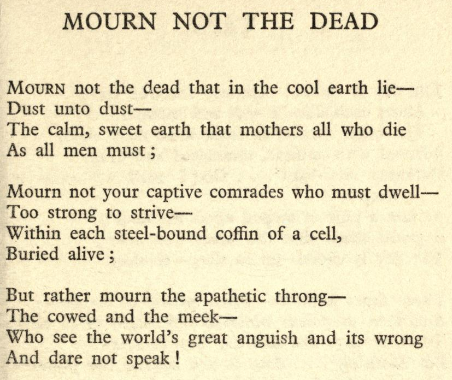
Hellraisers Journal – Wednesday January 15, 1919
Leavenworth Penitentiary, Kansas – Brutal Treatment of Prisoners Reported
From The New Appeal of January 11, 1919:
[Part 1 of 2.]
In its issue of last week The New Appeal reproduced a report of conscientious objectors at Camp Funston, Kans., detailing the brutal treatment to which they were subjected at the command of certain officers, contrary to the express directions of the war department in Washington. This report was published primarily as a matter of record, the guilty officers having been dismissed from the service and the conditions complained of corrected.
We are now in the way of making a more important exposure-an exposure of brutalities committed upon Socialists, I. W. W.s. and others imprisoned in the Federal penitentiary at Fort Leavenworth, Kans., brutalities that we have reason to believe have not been brought to the notice of the higher authorities since the efforts of interested persons to investigate these brutalities have been baffled at every turn by prison officials. Enough evidence has been dragged into the light, however, to make it shamefully plain, to use the words of Mrs. Floyd Ramp, wife of a Socialist prisoner, “that things are occurring in this penitentiary which citizens of a democracy should not knowingly countenance.”
Could Not Question Prisoners.
On December 12, F. H. Moore, a Chicago attorney, went to Leavenworth to discuss certain legal steps with the group of prisoners sentenced under the Chicago indictment of the I. W. W. alleged anti-war agitators. He also desired to make personal inquiry of the treatment the prisoners were receiving, disquieting reports of which had reached him through “underground” channels. In company with Miss Caroline A. Lowe, who assisted in the defense of the prisoners at the trial, Mr. Moore called upon the warden. They were told by the warden that they could talk over legal matters connected with the case, but they were absolutely forbidden to question the prisoners as to conditions in the penitentiary.
Mr. Moore, in a somewhat lengthy communication sent to The New Appeal, repeatedly emphasizes this autocratic censorship of the warden. As they interviewed, separately, each one of twenty-two prisoners held in solitary confinement with unusual punishment, the deputy warden, who was present during the interviews, sternly suppressed every attempt to question the prisoners as to the manner in which they had been handled and as to their physical condition at the time. Nor were Mr. Moore and Miss Lowe, when they met and conferred with the majority of the prisoners in a body permitted to refer to the condition of their fellow prisoners who were “in solitary.”
Prisoners Made Complaints.
Complaints made to the deputy warden in the presence and hearing of Mr. Moore and Miss Lowe revealed, however, that the solitary prisoners were faring most badly. They complained especially of being forced to sleep on the concrete floor without blankets and of being restricted to a diet of bread and water. Mr. Moore, in reporting to The New Appeal his inquiries regarding the twenty-two who had been marked as particular victims, makes the brief but eloquent remark after the name of each of seventeen of the twenty-five that “I was forbidden to ask if he was injured.” This was the kind of rigid secrecy met when the truth was sought in the name of humanity and justice. Four other solitary prisoners Mr. Moore was flatly refused speech with on the ground that he did not legally represent them, they not being I. W. Ws. Concerning the remaining four, Mr. Moore makes the following statements:
Richard Brazier was the first man brought in. He looked very badly. He stated that he was suffering acute pain from the condition of his ears; that the had been in the doctor’s care for over three months; he had been under isolation for seven days. He complained very bitterly to [Deputy Warden] Mr. [L. J.] Fletcher against being compelled to sleep on a bare cement floor without blankets. All of this discussion was over the vigorous protests of the warden, he stating that I was exceeding my rights, and that I would have to leave the penitentiary. Brazier stated that he had not been struck but that others had been.
John M. Foss looked extremely bad. His head was tied up in a towel. The warden asked him if he had been injured. He stated that he had not, that the bandage was due to terrific pains in his head. He then proceeded to upbraid the deputy warden for compelling him to sleep on the cement floor without blankets and to subsist on bread and water.
Ed Hamilton looked extremely bad, so weak that he could hardly stand up. Stated that he had fainted that morning. Mr. Fletcher asked if he had had a doctor. He said yes, and that the doctor had given him a dose of salts. Complained bitterly about being compelled to sleep on a cement floor without blankets and being kept on a bread and water diet. Miss Lowe tells me that he was sick and in a very weakened condition throughout the Chicago trial. He is a mere skeleton of a man. To keep him where he is means death.
“Pretty Badly Bunged Up.”
When refused permission to see one of the prisoners named Stratton, Mr. Moore asked the deputy warden if the report that the man had been injured was true, and the warden replied, with a smile, “Well, he was pretty badly bunged up.” Murphy, another prisoner who could not be seen, was also admitted by the deputy warden to be “pretty badly bunged up.” Mr. Moore says:
I then asked Mr. Fletcher if it was true that negroes, armed with clubs, had been turned in on white prisoners. He stated that there were colored convicts who had been promoted to the rank of orderlies and who were armed with clubs. I asked him if these were the men that “pretty badly bunged up” Stratton and Murphy. He stated that he had not seen them strike any one. I asked him if he knew whether they had struck any one. He stated that he did not. I then asked to see Floyd Ramp. I was refused on the ground that I did not represent him. When I asked as to whether or not he was injured I was told with a smile that he had been “pushed about some.”
[Emphasis added.]
[To be continued.]
~~~~~~~~~~~~~~~~~~~~~~
SOURCES & IMAGES
Quote from Frank Little, Chicago, July 1917
Wobbly: The Rough-and-tumble Story of an American Radical
-by Ralph Chaplin
University of Chicago Press, Jan 1, 1948
Chapter 18-War, pages 208-9
https://books.google.com/books?id=n-ygPQAACAAJ
The New Appeal
(Girard, Kansas)
-Jan 11, 1919
https://www.newspapers.com/image/67587211/
See also:
WE NEVER FORGET:
Political Prisoners of World War I Repression Who Lost Their Lives in Freedom’s Cause, 1917-1931
American Political Prisoners:
Prosecutions Under the Espionage and Sedition Acts
-by Stephen Martin Kohn
Greenwood Publishing Group, 1994
(search with names from article above)
Note: Kohn has Dep Warden Fletcher as Fleicher.
All newspaper accounts have him as Fletcher.
https://books.google.com/books?id=-_xHbn9dtaAC
~~~~~~~~~~~~~~~~~~~~~~~~~~~~~~~~~~~~~~~~~~~~~
Mourn Not the Dead by Ralph Chaplin
From Bars and Shadows, 1922
https://archive.org/stream/barsshadows00chaprich#page/14


